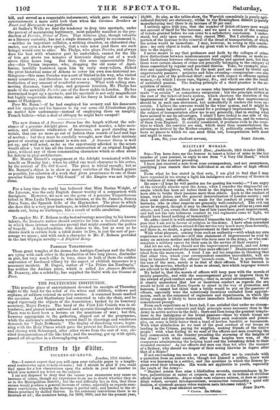MILITARY MORALS.
Lesketh How, Atnbkside, 18th October 1864. Son—You have done me the honour to insert a letter of mine in the last number of 'your journal, in reply to one from "A Very Old Hand," which appeared in the number preceding.
I have just received a note from your correspondent, and not anonymous, justifying your remark that the individual is an old officer of high official rank.
From what he has stated in that note I am glad to find that I may have regarded in too strong a light his -indulgence and advocacy of licence in the instance of Army officer*.
He says—(I hope he will pardon me for quoting his worde)—" I am angry at the cowardly attacks upon the Army, when I consider the disgraceful ex- ample which has been set before them in the highest ranks, who have not been able to bridle their passions more than others. Look to the conduct of kings, royal dukes, and the general demoralization of London society ; and then some allowance should be made for the conduct of young men in barracks' who in other respects are generally well-conducted. The evil can never be stopped, though it may be checked by such good advice as yours and others; and I am aware that there has of late years been great improvement, and had not the late infamous conduct in two regiments come to light, we should have heard nothing of immorality:" He adds—(and it is with satisfaction! transcribe his words)—" Do not sup- pose that I am not in favour of religion in the Army. I have often remarked with pleasure that officers attend divine service very much more than formerly, i and there , no doubt, a great improvement in their morals."
With what pleasure, coming from such an authority—with which my ovm experience so well accords—will this statement of improvement be read by many an anxious mother and father who have sons in the Army, or who con- template a military career for their sons in the service of their country ! And let me ask, why should not the improvement proceed, and our Army become more moral and at the same time more efficient ? Drunkenness is -van- ished from the mess-room. I trust I am not too sanguine in thinkingthat that other vice, which your correspondent consider* unavoidable, will are long be banished from the officers' barrack-room. What is practicable in the caseof the men, surely is in that of their officers. What barrack is there in the service, whether at home or abroad, into which improper women are allowed to be admitted ?
My belief is, that the morals of officers will keep pace with the morals of society generally, and with the encouragement given to improve them by the reward of good conduct and merit,—that isr mental advancement. Were it clearly understood that low or licentious conduct as regards the sex would be held at the Horse Guards to stand in the way of promotion and honours, I cannot but think that a bridle would be put on-the passions of officers, especially were the notoriously licentious excluded from appoint- ments, such as the command of regiments and departments, in which the living example is likely to have more immediate influence than the coldly remembered precept. From such experience as I have had, i am satisfied that underno circum- stances is the moral restraint and high principle more necessary than in the Army in active service in the field ; there and then being the greatest tempta- tions to the indulgence of the brutal passions—those by which troops are demoralized and discipline destroyed. 'Without such restraints and princi- ples, an army is little better than a band of lawless banditti or buccaneers. With what satisfaction do we read of the good conduct of our troops on landing in the Crimea, paying for supplies, making friends_ of the native people ! with what feeling do we read of the officers and men receiving the holy communion on the Sunday preceding the storming of the heights of the Alma! with what emotion, after those heights were won, of the conquerors administering the helping hand and the refreshing drink to their wounded enemies! As our officers and men tan thus not after the manner of a Sydney, why should we despair of their acting likewise in degree after that of a Scipio ? If not encroaching too much on your space, allow me to conclude with a quotation from an author who, though not himself a soldier, knew well what was becoming in a soldier, and the qualities to which the Roman le- gions owed their triumphs. His words are applicable to youth, especially the youth of the Army- " Marline autem Inc rotas a libidinibus arcenda, exciernendaque in la- bore, pafientiaque et csiinsi et eorporis, ut eorum at in belliois et eivilibus officiis vigeat industria. Atque edam cum relaxare animos, et dare as jueun- ditati volent, caveant intemperantiam, meminerint vereoundite quod erit facilius, si ejusmodi quoque rebus majores natu interease velink"• I am, Sir, your obedient servant, .Jousr Atom
• Cicero. Da Mal:


























 Previous page
Previous page